The following outline is provided as an overview of and topical guide to critical theory:

Jacques Marie Émile Lacan was a French psychoanalyst and psychiatrist. Described as "the most controversial psycho-analyst since Freud", Lacan gave yearly seminars in Paris, from 1953 to 1981, and published papers that were later collected in the book Écrits. Transcriptions of his seminars, given between 1954 and 1976, were also published. His work made a significant impact on continental philosophy and cultural theory in areas such as post-structuralism, critical theory, feminist theory and film theory, as well as on the practice of psychoanalysis itself.
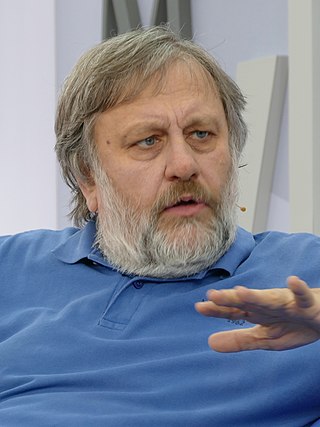
Slavoj Žižek is a Slovenian philosopher, cultural theorist and public intellectual. He is the international director of the Birkbeck Institute for the Humanities at the University of London, visiting professor at New York University and a senior researcher at the University of Ljubljana's Department of Philosophy. He primarily works on continental philosophy and political theory, as well as film criticism and theology.

Ernesto Laclau was an Argentine political theorist and philosopher. He is often described as an 'inventor' of post-Marxist political theory. He is well known for his collaborations with his long-term partner, Chantal Mouffe.
In continental philosophy and psychoanalysis, jouissance is the transgression of a subject's regulation of pleasure. It is linked to the division and splitting of the subject involved, which spontaneously compels the subject to transgress the prohibitions imposed on enjoyment and to go beyond the pleasure principle. Beyond this limit, pleasure then becomes pain, before this initial "painful principle" develops into what Jacques Lacan called jouissance; it is suffering, epitomized in Lacan's remark about "the recoil imposed on everyone, in so far as it involves terrible promises, by the approach of jouissance as such". He also linked jouissance to the castration complex, and especially to the aggression of the death drives.
In continental philosophy, the Real refers to the demarcation of reality that is correlated with subjectivity and intentionality. In Lacanianism, it is an "impossible" category because of its opposition to expression and inconceivability. The Real Order is a topological ring (lalangue) and ex-ists as an infinite homonym.
[T]he real in itself is meaningless: it has no truth for human existence. In Lacan's terms, it is speech that "introduces the dimension of truth into the real."
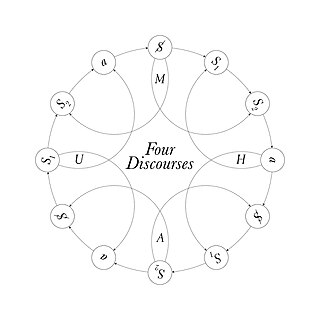
Four discourses is a concept developed by French psychoanalyst Jacques Lacan. He argued that there were four fundamental types of discourse. He defined four discourses, which he called Master, University, Hysteric and Analyst, and suggested that these relate dynamically to one another.
Freudo-Marxism is a loose designation for philosophical perspectives informed by both the Marxist philosophy of Karl Marx and the psychoanalytic theory of Sigmund Freud. Its history within continental philosophy began in the 1920s and 1930s and running since through critical theory, Lacanian psychoanalysis, and post-structuralism.
Sinthome is a concept introduced by Jacques Lacan in his seminar Le sinthome (1975–76). It redefines the psychoanalytic symptom in terms of the role of the subject outside of analysis, where enjoyment is made possible through creative identification with the symptom.
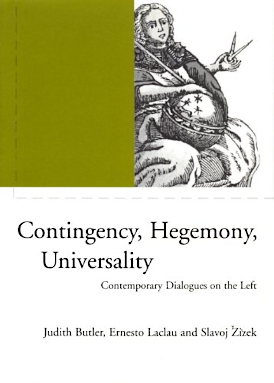
Contingency, Hegemony, Universality: Contemporary Dialogues on the Left is a collaborative book by the political theorists Judith Butler, Ernesto Laclau, and Slavoj Žižek published in 2000.
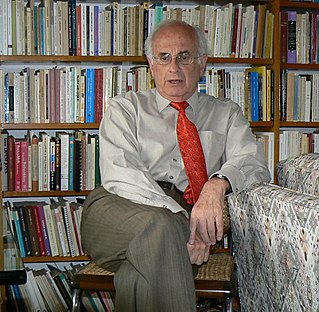
Néstor Alberto Braunstein was an Argentine-Mexican physician, psychiatrist and psychoanalyst.
Contemporary anarchism within the history of anarchism is the period of the anarchist movement continuing from the end of World War II and into the present. Since the last third of the 20th century, anarchists have been involved in anti-globalisation, peace, squatter and student protest movements. Anarchists have participated in armed revolutions such as in those that created the Makhnovshchina and Revolutionary Catalonia, and anarchist political organizations such as the International Workers' Association and the Industrial Workers of the World have existed since the 20th century. Within contemporary anarchism, the anti-capitalism of classical anarchism has remained prominent.
Ljubljana school of psychoanalysis, also known as the Ljubljana Lacanian School, is a popular name for a school of thought centred on the Society for Theoretical Psychoanalysis based in Ljubljana, Slovenia. Philosophers related to School include Rastko Močnik, Slavoj Žižek, Mladen Dolar, Alenka Zupančič, Miran Božovič and Eva Bahovec. Other scholars associated with the school include philosophers Zdravko Kobe, Rado Riha, Jelica Šumič Riha, sociologist Renata Salecl and philosopher Peter Klepec.
Psychoanalytic sociology is the research field that analyzes society using the same methods that psychoanalysis applies to analyze an individual.
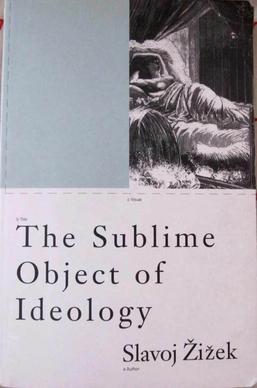
The Sublime Object of Ideology is a 1989 book by the Slovenian philosopher and cultural theorist Slavoj Žižek. The work is widely considered his masterpiece.
Walter A. "Mac" Davis is an American philosopher, critic, and playwright. He is Professor Emeritus of English at Ohio State University and the author of eight books. Davis has also taught at the University of California, Santa Barbara. His theoretical work engages critically with psychoanalysis, Marxism, existentialism, Hegelian dialectics and postmodernism. For a more general audience, he has written plays and two volumes of essays in cultural criticism.
Lacanianism or Lacanian psychoanalysis is a theoretical system that explains the mind, behaviour, and culture through a structuralist and post-structuralist extension of classical psychoanalysis, initiated by the work of Jacques Lacan from the 1950s to the 1980s. Lacanian perspectives contend that the world of language, the Symbolic, structures the human mind, and stress the importance of desire, which is conceived of as perpetual and impossible to satisfy. Contemporary Lacanianism is characterised by a broad range of thought and extensive debate between Lacanians.

The Parallax View (2006) is a book by Slovenian philosopher Slavoj Žižek. Like many of Žižek's books, it covers a wide range of topics, including philosophy, psychoanalysis, neuroscience, politics, literature, and film. Some of the authors discussed in detail include Jacques Lacan, Georg Wilhelm Friedrich Hegel, Karl Marx, Immanuel Kant, Martin Heidegger, Alain Badiou, Michael Hardt and Antonio Negri, Daniel Dennett, Antonio Damasio, Franz Kafka, and Henry James.
Lorenzo Chiesa is a philosopher, critical theorist, translator, and professor whose academic research and works focus on the intersection between ontology, psychoanalysis, and political theory.
Bruce Fink is an American Lacanian psychoanalyst and a major translator of Jacques Lacan. He is the author of numerous books on Lacan and Lacanian psychoanalysis, prominent among which are Lacan to the Letter: Reading Écrits Closely, The Lacanian Subject: Between Language and Jouissance (1995), Lacan on Love: An Exploration of Lacan's Seminar VIII and A Clinical Introduction to Lacanian Psychoanalysis: Theory and Technique.








